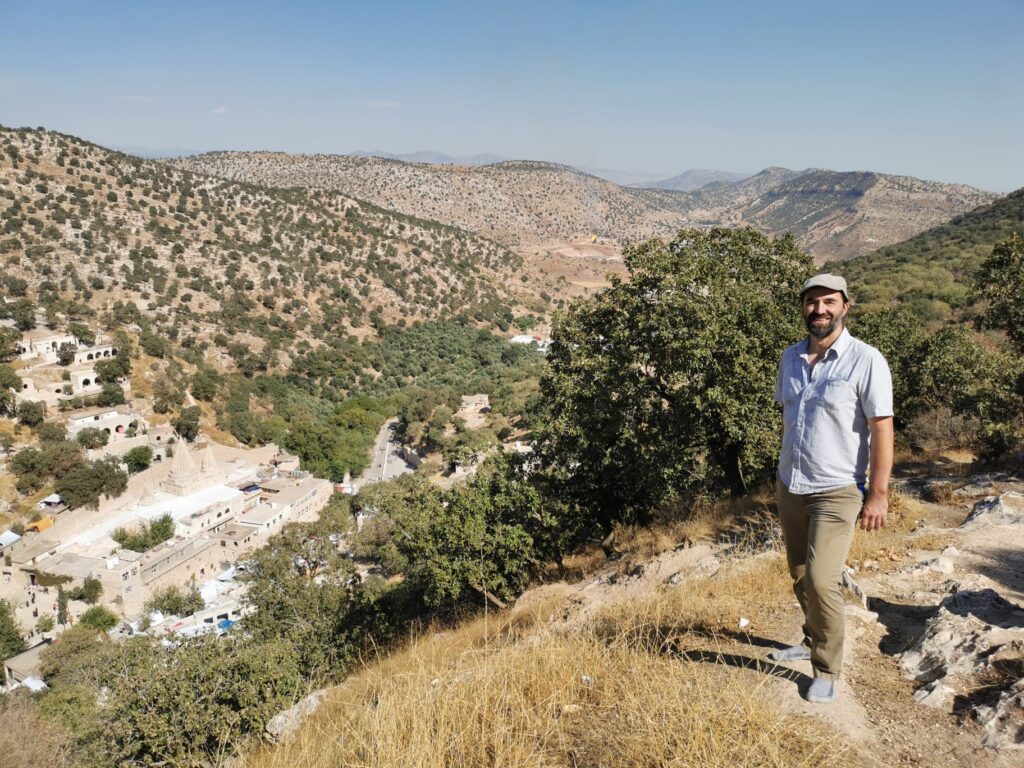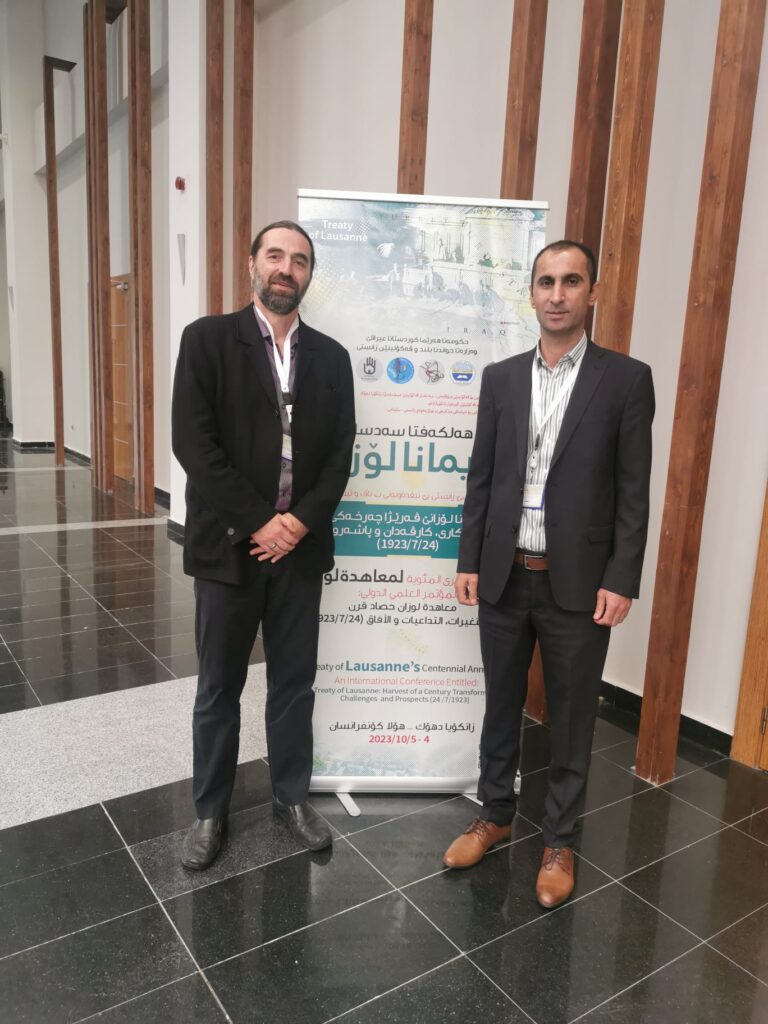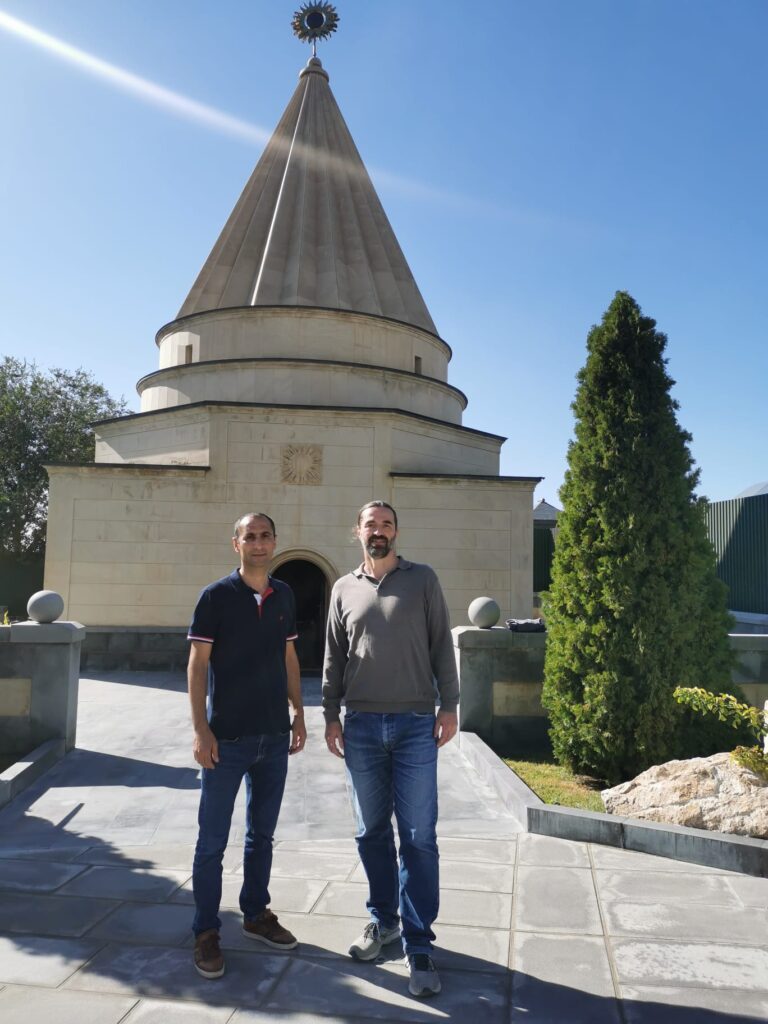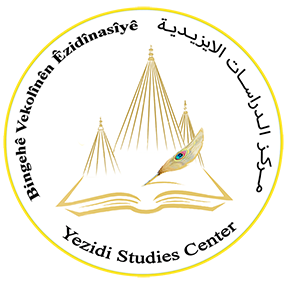Prof. Dr. Sebastian Maisel
on behalf of Yezidi Studies at the University of Leipzig
The Yezidi Studies Center at Leipzig University Leipzig is dedicated to advancing academic research on the Yezidi community, its religion, history, culture, and heritage. Established in 2021, our center aims to provide accurate, impartial knowledge and a neutral platform for researchers and those serving the Yezidi community, free from political, personal, or partisan conflicts. We emphasize our commitment to supporting the Yezidi community as a whole, promoting solidarity and self-determination without discrimination or alignment with any specific group, in the old and the new homeland.
The Center does not participate in or endorse conferences or activities that deliberately exclude or marginalize any Yezidi faction. Our academic and ethical responsibility is to remain an independent, scientific institution focused on serving the Yezidi community without politicization. We welcome collaboration with any entity or project that aligns with these principles and serves the Yezidi community. However, we urge organizers of Yezidi-related events to accurately represent our university’s position and avoid exploiting our reputation for purposes that do not benefit the Yezidis. We reserve the right to withdraw from any event that deviates from its stated goals or harms the community.
Our observations reveal concerning trends within some Yezidi initiatives, including personal disputes, partisan affiliations, and the exploitation of Yezidi issues for fame, political gain, or commercial purposes. Such practices undermine the community’s interests, particularly at a critical juncture in its history marked by past injustices and an uncertain future. Additionally, some individuals claim to represent all Yezidis, disregarding others’ perspectives, which fosters division and chaos. We believe no single party should speak for the entire community. Inclusive events with diverse specialists, including non-Yezidi researchers who support Yezidi causes, are essential for constructive dialogue and unity. The Center advocates for integrity, impartial debate, and meaningful collaboration to achieve positive outcomes for the Yezidi community. We are committed to supporting initiatives that uphold these values, whether we participate directly or not



Members of the global Yezidi community got together in Hannover, Germany on September 13-14, 2025 to hold a diaspora conference under the slogan Through Dialog – Towards Reorganization and Institutionalization. Considering the current dispersion of Yezidis across many countries and continents as a result of multiple genocidal attacks and persecution this offered an opportunity to unify the various segments of the Yezidi community who share a common belief in the Yezidi religion, but represent multiple geographical, cultural and political identities. Of the approximately 800,000 Yezidis worldwide, half of the population resides in Iraq, the old ancestral homeland. In Syria, also considered part of the traditional Yezidi homeland, only about 6,000 remain as well as a few hundred in Turkey. Some 50,000 Yezidis live in Armenia and Georgia where they have established their faith and culture for over 100 years. That leave the remaining Yezidis to live away from the homeland, in exile or the diaspora. Germany is now home to over 200,000 Yezidis, while Russia hosts about 50,000. Smaller groups settle in other European countries in addition to ca. 5,000 Yezidis in the USA and 4,000 in Australia. In some cases, Yezidis live in their new home country for two or three generations, integrating into the society and often acquiring citizenship. The reasons for the mass exodus are simple: constant discrimination and fear of oppression by state authorities and the majority Muslim population, which at times led to genocide. In their oral historical memory, Yezidis speak of 74 fermans (genocide) they endured by fanatical Islamic armies, mobs, neighbors, and governments. The last ferman was the 2014 genocide, when the so-called Islamic State and other related militants attacked the Yezidi communities in Iraq and Syria, killing or enslaving thousands, destroying the land and the religious sites, brainwashing children with the ultimate goal of eradicating Yezidism and the Yezidis. As a result, many fled internally, to camps in safe areas, and internationally, to find a place, where they can exist as humans, as Yezidis. Today, the diaspora community represents survivors, migrants, refugees and their families from different backgrounds with often traumatic experiences and tragic stories of hardship and loss. In the old homelands, the remaining communities scrambled to keep the structure and cohesion of their families and religion intact with varying degrees of success. Aside from the physical, economical and legal needs that not met, the community also seeks answers for certain spiritual and cultural issues that haunt survivors or genocide, rape, slavery and other traumas. How can they move on as a society when so many values and pillars of their world view and faith have been shattered? It is time to adjust or reform some of these rules, beliefs and practices? The diaspora community faces similar challenges and transformations. As a conglomerate of different generations, backgrounds, languages, and statuses, they too begin to question the old concepts, results, and events that led to the current situation in the new homelands. And here is where the idea of a diaspora conference comes in, as an attempt to find answers to these core-shaking questions and to find solace in the common fate and experience.
Based on the initiative of several Yezidi community leaders, the organization team, led by Dr. Khalil Jindi, a well-known expert on Yezidi religion and society put together the agenda for a large, inclusive meeting of Yezidis in the diaspora to discuss these burning issues in an institutionalized setting of a conference or congress. But how do you manage to bring together a global diaspora community with varying interests and needs? This immediately leads to the important question, who speaks for the Yezidis in the diaspora? Who represents them and their agendas? One way of dealing with the multitude of representation is to invite them all and give everybody a platform to express themselves and to vote in any decision-making. That meant that the organizers decided to invite all Yezidi organizations in the diaspora as well as representatives from the old homeland. Aside from the logistical problems, this concept was difficult to implement. The biggest obstacle is the fragmentation of the Yezidi community with its strict hierarchies according to origin, status group, and tribe. Certainly, political affiliation, educational level and gender played another role in the selection process. The Yezidi community in the old homeland is as divided as the community in the diaspora with very few common denominators even in religious matters. Membership in particular political parties (KDP, PUK, PKK) as well as having a hardline opinion on the issue of ethnic/linguistic origin of the Yezidis were other criteria for determining the level of inclusion. At the end, some 450 guests attended the conference with notable absences of prominent community leaders, academics and public figures. Local and international politicians and supporters of the Yezidi cause participated as well. The format was based on several expert discussion panels, speeches and creating a new body of representation, the Yezidi Diaspora Congress (YDC) with 53 candidates elected for a two-year term. This body is tasked with implementing some of the resolutions adopted by the conference.
Here is the final list of resolutions (translation from the Arabic original):
- Work to replace oral traditions and ill-considered decisions in the structure of the Yezidi community with institutionalized work based on a constitution and bylaws for collective decision-making.
- Work to expand the Supreme Yezidi Spiritual Council, the Spiritual Council of Lalish, to include all regions (Shingal, Syria, Turkey, Armenia, and Georgia) and all social classes. Women should also be represented on the council with at least one seat.
- Preserve the beliefs, culture, and language of the Yezidi community wherever it exists, striving to achieve a dignified life rooted in the relevant social systems.
- Develop appropriate solutions to reorganize administrative, economic, and financial structures, which are urgently needed in light of current requirements.
- Work to build an independent and effective Yezidi economy by investing Yezidi revenues and resources for the benefit of the entire Yezidi community. This will halt the exploitation of holy sites as commercial commodities, allowing them to be used for the benefit of the Yezidi community.
- Strengthen contemporary institutionalism and professionalism at all levels of our society systematically.
- Establish in the long term, a global institution, the World Yezidi Congress, to represent the interests of all Yezidis worldwide.
- Establish in addition to the Yezidi Council in Diaspora, a religious council for Yezidis in Diaspora, with the Yezidi Council responsible for its establishment.
- Establish an advisory council composed of international experts and friends of the Yezidis to provide advisory support to the work of the Yezidi Council in Diaspora.
- Develop a unified Yezidi discourse based on human rights, international law, and humanitarian values, expressing Yezidi concerns in clear and unequivocal language.
- Internationalize the Yezidi issue: The Yezidi issue should be permanently included on the agenda of international and regional institutions, such as the United Nations Human Rights Council, the International Criminal Court, the European Parliament, and national parliaments.
- Activate and organize political and legal presence in the diaspora by building effective structures and networks that defend Yezidi rights at the local, national, and international levels.
- Raise awareness to remember and work that equality between women and men, tolerance, and openness to others become fundamental principles of our society. Furthermore, balanced administrative procedures should be established in all leadership structures, including at the spiritual and religious levels, to ensure fair representation and broad participation, especially of women and youth.
- Separate religion from politics by establishing an independent religious affairs body, protecting it from political domination and preserving its credibility.
- Establish a legal charter and code of conduct to regulate relations within operating structures, including workflow, accountability, and transparency.
- Establish a documentation center and specialized library to protect cultural and religious identity, preserve heritage, and record human rights violations.
- Strengthen the role of youth through education, sports, training, and empowerment programs to ensure the sustainability of the project and train future leaders.
- Work to achieve official recognition of the Yezidi religion in all European countries, as well as in the United States, Canada, Australia, Turkey, and Syria. Preferably, it should be established as an institution under public law.
- Work to recognize Shingal as an independent special administrative governorate, granting it special status to protect the rights and identity of the Yezidis in the region, ensure reconstruction, and implement justice in destroyed areas, especially Shingal, and support the voluntary and safe return of displaced persons.
- Prepare for an international conference for the reconstruction of Shingal and establishing an aid fund under international supervision.
- Reject any foreign intervention in Shingal that would harm the region and unconditionally contradict the will of the population.
- Build a genocide memorial on Mount Shingal, representing a historical memory that gains in importance and value with each passing day.
- Address the situation of the Yezidis in Syria, particularly in Afrin and Serekaniye, broadly and internationally. We support and bless the conference’s construction of the Yezidi temple in Rojava.
- Exercise and intensify the necessary influence on the new Syrian government at the international level to ensure the release of all Yezidi children and women detained in Syria.
- Form and activate specialized committees, open to participation by parties and individuals who were not able to participate in the conference.
- Establish an institute or university for the study of Yezidi theology in Lalish or Sinjar, to graduate competent clerics.
- Defend the Lalish Temple and other shrines wherever they are located, maintain and restore them by all means.
- Commit to bringing together existing associations and organizations in each country of the Yezidi diaspora and forging alliances among them.
- Prevent and halt the ongoing demographic and cultural change targeting the Yezidi community.
- Take effective measures against any form of intolerance and glorification of violence perpetrated in the name of our religious community on social media, and develop appropriate media outlets.
- Work to ensure that Turkey and Syria also recognize the genocide that occurred on August 3, 2014.
In the run-up to the conference, concerns were raised from within the Yezidi community that this conference aimed at not only reforming, but changing basic tenants of Yezidism, including the status groups (sheikh, pir, mirid), the office of the Mir, marriage rules (sed u hed), and the dowry. This went hand in hand with fears of political and financial meddling and influencing by outside forces, parties, even Muslim circles. It also demonstrates the plurality of opinions and identities within the community as well as the lack of transparency and inclusion. Yezidis who did not feel represented by the conference and disagreed with the its agenda protested at the venue and expressed their anger, sometimes not in a peaceful way. What could have been an event that brings together the diaspora community ended up in the media as a sign of how deeply divided the Yezidis are and how little they can agree on.
But what else can we take from the conference? Sincere attempts have been made and first steps have been implemented to build a common frame for the scattered diaspora community. Less formal prescription of how to do that and more grassroot involvement appears to be the direction to move forward. Encouraging local Yezidi communities in the various places of their residence to work on a road-map for the future, how they envision their future. Collecting these opinions and find common ground first at a low-level meeting, organized by a neutral body, is a longer, but more sustainable approach in the process of reforming a religion and community that is several thousand years old. The Yezidi Studies Center as mentioned in its mission statement is ready to participate in the meaningful and important process.
